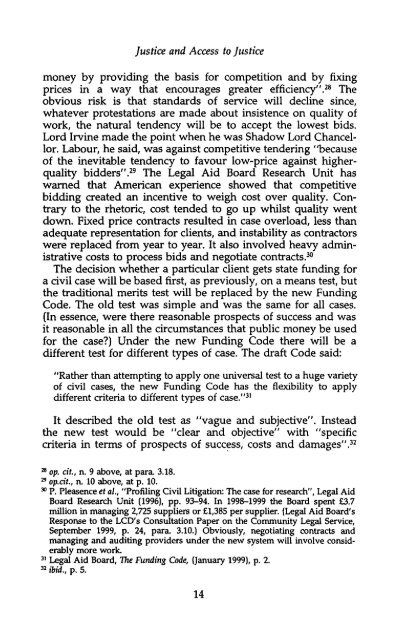HAMLYN - College of Social Sciences and International Studies ...
HAMLYN - College of Social Sciences and International Studies ...
HAMLYN - College of Social Sciences and International Studies ...
Create successful ePaper yourself
Turn your PDF publications into a flip-book with our unique Google optimized e-Paper software.
Justice <strong>and</strong> Access to Justice<br />
money by providing the basis for competition <strong>and</strong> by fixing<br />
prices in a way that encourages greater efficiency". 28 The<br />
obvious risk is that st<strong>and</strong>ards <strong>of</strong> service will decline since,<br />
whatever protestations are made about insistence on quality <strong>of</strong><br />
work, the natural tendency will be to accept the lowest bids.<br />
Lord Irvine made the point when he was Shadow Lord Chancellor.<br />
Labour, he said, was against competitive tendering "because<br />
<strong>of</strong> the inevitable tendency to favour low-price against higherquality<br />
bidders". 29 The Legal Aid Board Research Unit has<br />
warned that American experience showed that competitive<br />
bidding created an incentive to weigh cost over quality. Contrary<br />
to the rhetoric, cost tended to go up whilst quality went<br />
down. Fixed price contracts resulted in case overload, less than<br />
adequate representation for clients, <strong>and</strong> instability as contractors<br />
were replaced from year to year. It also involved heavy administrative<br />
costs to process bids <strong>and</strong> negotiate contracts. 30<br />
The decision whether a particular client gets state funding for<br />
a civil case will be based first, as previously, on a means test, but<br />
the traditional merits test will be replaced by the new Funding<br />
Code. The old test was simple <strong>and</strong> was the same for all cases.<br />
(In essence, were there reasonable prospects <strong>of</strong> success <strong>and</strong> was<br />
it reasonable in all the circumstances that public money be used<br />
for the case?) Under the new Funding Code there will be a<br />
different test for different types <strong>of</strong> case. The draft Code said:<br />
"Rather than attempting to apply one universal test to a huge variety<br />
<strong>of</strong> civil cases, the new Funding Code has the flexibilityto apply<br />
different criteria to different types <strong>of</strong> case." 31<br />
It described the old test as "vague <strong>and</strong> subjective". Instead<br />
the new test would be "clear <strong>and</strong> objective" with "specific<br />
criteria in terms <strong>of</strong> prospects <strong>of</strong> success, costs <strong>and</strong> damages". 32<br />
28 op. at, n. 9 above, at para. 3.18.<br />
29 op.cit., n. 10 above, at p. 10.<br />
30 P. Pleasence et al., "Pr<strong>of</strong>iling Civil Litigation: The case for research", Legal Aid<br />
Board Research Unit (1996), pp. 93-94. In 1998-1999 the Board spent £3.7<br />
million in managing 2,725 suppliers or £1,385 per supplier. (Legal Aid Board's<br />
Response to the LCD's Consultation Paper on the Community Legal Service,<br />
September 1999, p. 24, para. 3.10.) Obviously, negotiating contracts <strong>and</strong><br />
managing <strong>and</strong> auditing providers under the new system will involve considerably<br />
more work.<br />
31 Legal Aid Board, The Funding Code, (January 1999), p. 2.<br />
32 ibid., p. 5.<br />
14

















